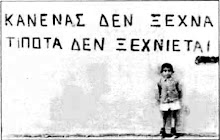 O Mουσταφά Κεμάλ με τοπικό ηγέτη των κούρδων Ζάζα του Ντερσίμ, όταν υπέκλεψε την υποστήριξή τους για την αντιμετώπιση των Ελλήνων και την εκπροσώπησή τους στη διάσκεψη της Λοζάννης. Αργότερα οι υποσχέσεις ξεχάστηκαν και οι Κούρδοι επαναστάτησαν πολλές φορές, με τελευταία την επανάσταση των Κούρδων Ζάζα, του Ντερσίμ (1938)
O Mουσταφά Κεμάλ με τοπικό ηγέτη των κούρδων Ζάζα του Ντερσίμ, όταν υπέκλεψε την υποστήριξή τους για την αντιμετώπιση των Ελλήνων και την εκπροσώπησή τους στη διάσκεψη της Λοζάννης. Αργότερα οι υποσχέσεις ξεχάστηκαν και οι Κούρδοι επαναστάτησαν πολλές φορές, με τελευταία την επανάσταση των Κούρδων Ζάζα, του Ντερσίμ (1938)Το τουρκικό βαθύ κράτος, που ζει και βασιλεύει, παρά τις εξαγγελίες του Ερντογάν για εκδημοκρατισμό, προσπαθεί να διασπάσει τους Κούρδους, ενισχύοντας τον εθνικισμό των Κούρδων Ζαζά, προβάλοντας τη θεωρία ότι οι Ζαζά δεν είναι Κούρδοι και ότι αποτελούν ιδιαίτερη εθνότητα της Ανατολίας.
Διαβάστε το σχετικό άρθρο που αναδημοσιεύουμε από την ιστοσελίδα του ιδρύματος "The Jamestown Fountation".
Is Ankara Promoting Zaza Nationalism to Divide the Kurds?
January 28, 2009
By: Wladimir van Wilgenburg
Until recently, speakers of the Zaza language within Turkey have been considered part of the vast Kurdish ethnic group spread over Turkey, Iraq, Iran, and Syria. In the 1980s, the creation of a Latin alphabet suitable for Zaza-language publishing created a renewal in Zaza literature and culture, leading...to the development of a type of Zaza nationalism that some Kurds suspect is inspired by Turkey’s intelligence agencies as a means of dividing the Kurds and weakening the Kurdish militants of the Kurdistan Workers Party (Partiya Karkeren Kurdistan - PKK).
Zaza nationalism is still opposed by some Zaza-speakers who consider themselves Kurds. [1] Zaza nationalism is focused on the Zazaki dialect and native Zazaki speakers in Turkey. Some Zaza nationalists also want an independent Zaza homeland called Zazaistan in Turkey, potentially weakening the appeal of the PKK among speakers of the Zazaki dialect.
In terms of faith, the Zaza (whose numbers depend on still-contentious ethnic and linguistic definitions but may be placed between one to three million) are roughly divided between Sunni Muslims and Alevis. Usually Zazaki speakers are called Kurds, and Zazaki is considered as a Kurdish language by Kurdish nationalists and many scientists. Zaza nationalists argue that they form their own people on the basis of a lack of mutual comprehensibility between Zaza and the Kurmanci dialect of Kurdish, spoken by nearly 80% of all ethnic Kurds. Some linguists argue that Zaza is not related to the Kurdish language or its dialects. However, ethnic identities are influenced by subjective factors as much as objective factors like genetics and linguistics. Ethnic identities in general are social constructions and can be influenced by state policies.
Zaza nationalism grew primarily in the European Zaza diaspora where the differences between the Kurmanci and Zazaki dialects became more visible due to the freer environment. In Europe, migrants from Turkey were not forced to learn Turkish, but could choose between Kurmanci and Zazaki as a “mother language.” This resulted in Zaza-nationalism in some cases. [2] Another factor was the opposition of some Kurdish nationalists to Zazaki publications. Currently Zaza “nationalism” is still largely a matter of exile politics and seems to be a marginal phenomenon, but it is also starting to influence the debate on ethnic identity in Turkey.
The recent discussion about “mother language education” in Turkey and the policy of the Justice and Development Party (Adalet ve Kalkınma Partisi - AKP) government to open a Kurdish-language television station could strengthen the divisions between Kurmanci and Zaza speakers (see Terrorism Focus, January 13). The current TRT 6 channel only broadcasts in Kurmanci, but there are also plans to broadcast in the “Kurdish dialects Zaza and Sorani” (Hurriyet, January 2). This was welcomed by several Zaza speakers (Bianet.org, January 7). On internet forums, however, Zaza nationalists have already emphasized that they want a Zaza channel, not a Kurdish Kurmanci channel.
Anthropologist Martin van Bruinessen has described the popular conspiracy theory among Kurds that Zaza nationalism is a machination of the Turkish intelligence services. [3] The claims of Kurdish nationalists may not be completely unfounded. In fact, many Turkish nationalists support the notion that Zazas are not Kurds. They think this could hasten the assimilation of Kurds and weaken support for the PKK.
In 1996 the Turkish Democracy Foundation (TDF - a non-governmental organization devoted to “the creation of a stable democracy in Turkey”) published a small booklet condemning the PKK’s brand of Kurdish nationalism. They focused on the “heterogeneous” nature of Kurds and emphasized that some Zazas do not see themselves as Kurdish. The booklet noted that Kurds would rather be part of a democratic Turkey than become “part of a heterogeneous community entangled in intertribal violence and marked with the hegemony of tribal thinking.” [4]
But Turkish interest in the cultural heterogeneity of Kurds is older. The Turkish nationalist Hasan Resit Tankut proposed in 1961 to create a Turkish corridor between Zaza and Kurmanci speakers to accelerate their integration into Turkish culture. Some other Turkish authors have presented the Zaza speakers as a distinct ethnic group, different from the Kurds. [5]
Some Kurds have suggested a link between the Sunni founder of Zaza-nationalism, Ebubekir Pamukcu (d.1993), and the Turkish intelligence services, accusing Pamukcu of helping split the Kurdish nation. The Zaza-nationalistic movement was welcomed and financially supported by certain circles in Turkey’s intelligence establishment and Pamukcu has since been accused of having ties to Turkish intelligence. [6] A Zaza publisher in Ankara is believed by some Kurds to be controlled by the Turkish intelligence services. In an interview with Kurdmedia, Kurdish nationalist and Zazanki linguist Mehmet Malmisanij said the name of this “Zazaistan” publisher was the “Zaza Culture and Publication House” and was part of the Turkish intelligence services with the task of attacking the Kurdish nationalist movement. “The conclusion that I draw… is that these [Zaza nationalist groups] were groups based in the state, or with a more favorable expression, groups that thought in parallel with the state” (KurdishMedia.com, October 6, 2003).
PKK-leader Abdullah Ocalan also claimed that Turkey’s National Intelligence Organization (Milli Istihbarat Teskilati – MIT) is behind the growing political and cultural activities of the Zazas in Turkey: “The MIT is behind this. They are doing this to stop the development of Kurdish national consciousness.” [7]
There are also signs a separate Zaza identity is getting more attention in the political sphere. Turkey’s Nationalist Movement Party (Milliyetci Hareket Partisi - MHP) has never used the Kurdish language in political statements, but MHP member Abdullah Arzakcı made a surprising speech in Kurdish in 2006 in which he said, “I'm Zaza, I'm Kurd. There is no Kurdish problem.” (Zaman, 15 may 2006). Arzakcı intended to show that it is no longer a problem in Turkey to call oneself Kurdish or Zaza.
In 2007 the polling company Konda took an important step by making an ethnic differentiation between Zazas and Kurds (Milliyet, March 22, 2007). Earlier a Turkish nationalist think-tank reported on “Zaza-Kurds” and there are steadily more Turkish newspapers and online publications that conclude Zazas are not Kurds. An example is the contribution of a Zaza reader to the newspaper Today’s Zaman. She stressed that there are “millions of Kurds, Zazas and Laz who do not see themselves as different from their Turkish brothers and sisters, and their problems are no different from the problems of this country.” The writer emphasized her loyalty to Turkey (Today’s Zaman, August 23, 2008).
Even Turkish premier Recep Tayyip Erdogan made a distinction between the Zazas and Kurds when he visited Hakkari in November 2008 (Zaman, November 2, 2008). The former mayor of Sur in Diyarbakir province, Abdullah Demirbas (a member of the ethnic-Kurdish Democratic Society Party – DTP), recently denied the existence of any influence from Zaza-nationalism on the population of southeast Turkey, but it is clear Turkish politicians are starting to distinguish between the Zazas and Kurds (Kurmanci-speakers), apparently to weaken Kurdish nationalist claims (Kurdmedia.com, January 20).
Most Zaza nationalists are hostile to the PKK, something that can be useful to Ankara in its fight against Kurdish militancy. Zaza nationalists accuse the PKK of “anti-Zaza” activities and blame both the Turkish military and the PKK for the depopulation of Zaza regions. [8] Zaza nationalists fear assimilation from both Kurdish nationalists and the Turkish state.
It is likely that the Zaza identity could become another tool in the political battle between Turkey and the Kurdish nationalists. A freer cultural climate in Turkey with more space for education in native tongues like Zazaki and Kurmanci could also eliminate the concept of a “Turkish enemy” among non-Turkish ethnicities. In this case the nationalism of the Kurds could become a bigger threat to Zaza speakers than Turkish nationalism.
The problem is that Turks fear that this will result in the end of the state due to the presence of many ethnicities in Turkey. The Ottoman Empire was divided into ethnic regions (Greek, Armenian, Kurdish, etc) by the Allied Forces after World War I with the 1920 Treaty of Sevres. This has made the Turks afraid of once more losing territory to ethnic nationalists, a condition some call “Sevres paranoia.”
In the end Zaza-nationalism could play a role in the ongoing Turkish-Kurdish debate, but it is not clear whether the Zaza-identity will become popular among Zaza-speakers who still classify themselves as Turks and Kurds. If the Zaza-identity becomes more popular, this could decrease support among the one to three million Zazas for the PKK and weaken Kurdish nationalism.
Notes:
1. Martin van Bruinessen, "Kurdish Nationalism and Competing Ethnic Loyalties", Original English version of: "Nationalisme kurde et ethnicités intra-kurdes," Peuples Méditerranéens no. 68-69 (1994), pp.11-37.
http://www.let.uu.nl/~martin.vanbruinessen/personal/publications/Competing_Ethnic_Loyalties.htm.
2. Martin van Bruinessen, op cit.
3. Ibid.
4. Turkish Democracy Foundation, Fact Book on Turkey Kurds and the PKK terrorism, 1996. URL: http://www.geocities.com/CapitolHill/8572/ii.htm.
5. Martin van Bruinessen, “Constructions of ethnic identity in the late Ottoman Empire and Republican Turkey: The Kurds and Their Others,” March 8, 1997. http://www.let.uu.nl/~martin.vanbruinessen/personal/publications/constructions_of_ethnic_identity.htm.
6. Ibid.
7. Unpublished interview by Paul White with PKK leader Abdullah Ocalan, at the Mahsum Korkmaz Akademisi, Lebanon, July 2, 1992.
8. Zulfü Selcan, Grammatik der Zaza-Sprache, Nord-Dialekt (Dersim-Dialekt), Wissenschaft & Technik Verlag, Berlin, 1998, p. 23.
ΤΟ ΕΙΔΑ ΣΤΟ: infognomonpolitics
Πηγή: The Jamestown Fountation





































Δεν υπάρχουν σχόλια:
Δημοσίευση σχολίου